How to choose the right cylinder for your lawn
How to choose the right cylinder for your lawn
Just like in life, the saying “Less is more” is more than valid for choosing the cylinder for your lawn. It is not always true that more blades will be a better fit for your lawn and mowing style. It is dependent on multiple factors, such as mowing intensity and quality or thickness of the mowed lawn.
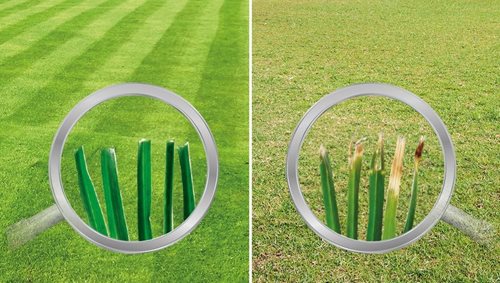
What is a cylinder and how is it different from mowing with a rotary mower?
Even though this may seem as a redundant question to experienced lawn enthusiast, there are still many people who have not been familiarised with the principle of cylinder mowing. In short, it can be explained that a cylinder mower does not cut the grass like a knife of a standard rotary mower; it trims it. Every grass blade is gently and cleanly trimmed on a scissor-like principle.
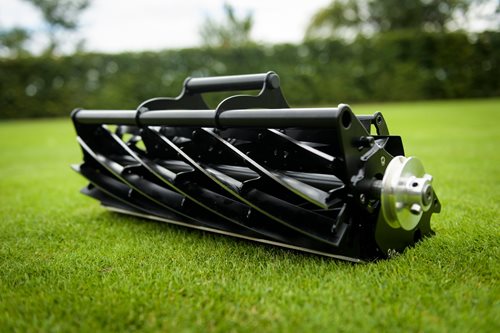
What cylinders are the most common?
You will come across a 5-blade cylinder the most often, primarily in hand-led cylinder mower with a manual drive. They are used because of the lower weight of the mower and because of their practical usability. A cylinder with fewer blades can trim longer grass. On the contrary, a 10-blade cylinder can be frequently found on golf courses, which need to be mowed more often and to a lower height.
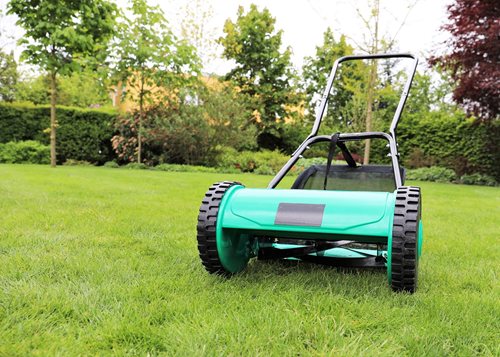
What does the number of blades say about cylinders?
The number of blades on the cylinder, along with the cylinder diameter significantly influence the maximum possible mowing height. The further apart the blades are, the taller grass can be theoretically mowed by the cylinder. The more the blades, the more does the mower lose the ability to mow taller grass, because the space between individual blades is smaller. Thus, only shorter grass blades will manage to get into the cylinder.
The maximum mowing height of a self-propelled cylinder mower is usually between 8 and 10 mm. Nothing very different is practically possible because of the front roller. It drives before the cylinder and lays individual grass blades down so that they can rise again and can be trimmed by the cylinder. Taller grass would not be able to rise and the mower would ride over it.
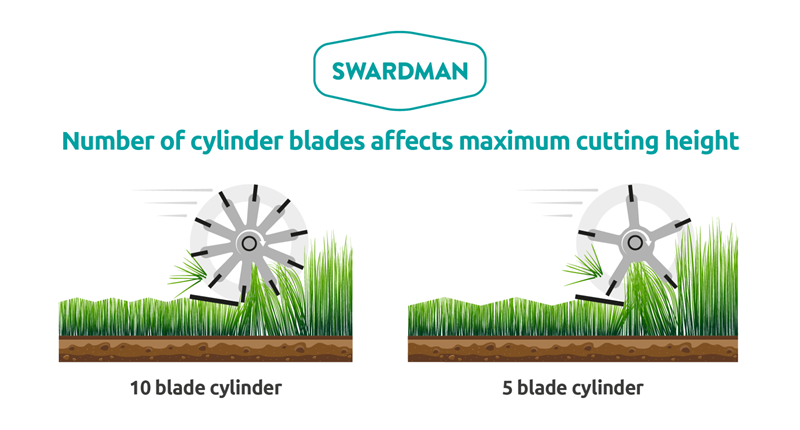
The number of blades also influences the cutting frequency, which is a key parameter of cylinder mowers. This frequency indicates how many times the blades of the cylinder can cut within one meter. For example, a 10-blade cylinder and a low number of revs can mow worse than a 5-blade cylinder with a high number of revs. The revs must be set up so that they ensure a high-quality cut, but without unnecessary damage to the blades due to overly high rev count. This influences the longevity of the cylinder and a possible number of sharpenings. High revs also usually cause more cylinder noise.
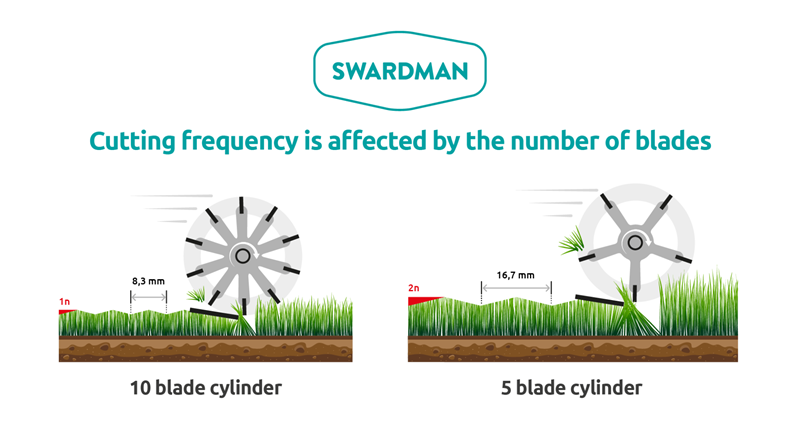
Which cylinder is right for me?
Each cylinder has its pros and cons and it is impossible to make an absolute statement that a 5-blade cylinder is worse than a 10-blade cylinder or vice versa. However, it is clear that the 5-blade and 6-blade cylinder have more practical use than the 10-blade cylinder. But if you wish to maintain a true English-style lawn, or even a green, it will need a more regular care and more frequent mowing with a cylinder with a higher blade count.
Characteristics – 5-blade cylinder
- Cutting frequency is 60 cuts per meter
- Recommended mowing height is 25 - 45 millimetres
- Most frequently used in manual and electric cylinder mowers
- Successfully mows the lawn even in a non-regular routine, can mow taller grass, can also handle mowing frequency 1x per week (but not less)
- Thanks to 5 blades, it has a lower cutting frequency, which in the case of a low and dense lawn can cause a lawn "corduroy" or a ridged effect after mowing. If this happens, it is time to switch to a cylinder with a higher number of blades.
Swardman 5-blade cylinder
This type of cylinder is practically risk-free. It has the biggest mowing range, so it does not require complete discipline in mowing regularity (but it does not mean you will get an English-style lawn without discipline). The 5-blade cylinder is also a little lighter and cheaper to produce. Therefore, it primarily addresses the customers who require a lower weight of the mower and a lower price. This is the most appropriate option for those who have not mowed with a cylinder mower and who are not yet used to the mowing regularity. It is also a good fit for those who travel a lot and are not always able to mow the lawn according to their plans, or as a backup cylinder for users of a 10-blade cylinder, for cases such as a sudden spindle dulling or when mowing after returning from vacation.
Characteristics – 6-blade cylinder
- Cutting frequency is 72 cuts per meter
- Recommended mowing height is 20 - 40 millimetres
- Most frequently used in cylinder mowers with a drive
- Good cut, ideal for gardens
- Requires mowing 1x to 2x per week
- Thanks to 6 blades, it has a middle to lower cutting frequency, which in the case of a low and dense lawn can cause a lawn "corduroy" or a ridged effect after mowing. If this happens, it is time to switch to a cylinder with a higher number of blades.
Swardman 6-blade cylinder
This type is a good choice for everyone who have already had a cylinder mower or who are used to mowing twice a week and want to cut their lawn under 25 mm.
Characteristics – 10-blade cylinder
- Cutting frequency is 120 cuts per meter
- Recommended mowing height is 10 – 20 millimetres
- Most frequently used in cylinder mowers for golf greens
- Excels with dense cut, suitable for low cutting up to a few millimetres
- Requires mowing 2x to 4x per week; cannot mow taller grass
Swardman 10-blade cylinder
This type is suitable for everyone who wants to increase the quality and density of their lawn or those who want to keep a home green. Of course, it is also intended for classic golf greens, driving ranges and all extra short lawns and for users who have already been mowing with a 10-blade cylinder. It can also be used as a spare cylinder with a 5 and 6-inch cylinder for when you have the time to mow more often.
